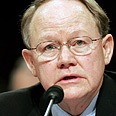
צילום: AFP
US intel chief: Iran threat biggest worry
As he prepares to leave office, National Intelligence Director Michael McConnell tells reporters US intelligence agencies do not have evidence to prove Tehran has decided to build nuclear warhead, but he shares alarm that possibility may come soon
Iran producing a nuclear weapon and a cyber attack on critical government or private computer networks top the list of concerns nagging at National Intelligence Director Michael McConnell as he prepares to leave office.
McConnell told reporters in an interview Friday that US intelligence agencies do not have evidence to prove Iran has decided to build a nuclear warhead, but he shares the alarm of outgoing CIA Director Michael Hayden that the possibility may come soon.
He said Tehran is two to three years away from having a long-range missile that could reach Europe, and continues to produce low-enriched uranium, the raw ingredient for the fissile material needed for a warhead.
"I'm very concerned Iran will continue down a path that will result in a nuclear weapon," he said.
He is especially worried about the effect it would have in the Middle East, either kicking off a regional arms race or a war.
McConnell said that protection of US computer networks — government, military and commercial — is another major worry.
"Cyber security is the soft underbelly of this country," he said.
His fear is less that information would be stolen off the networks by hackers or spies but that they would destroy it outright.
"It could have a debilitating effect on the country," he said.
The federal government is still building its cyber protection plan, with the Homeland Security Department nominally in charge. But McConnell said the spy agencies, especially the National Security Agency, have to play a key role in protecting domestic computer networks. That prospect alarms privacy and civil liberty advocacy groups, who oppose giving agencies meant to spy on foreign powers access to private citizens' data and activities on the Internet.
"We're the spies, but we've got to be in that network to do the defense. Do you trust us? That's what the debate is going to be about."
Breaking down walls between the 16 intelligence agencies to force cooperation and sharing is one of the central functions of the national intelligence director. He said a new policy that requires the sharing of all finished intelligence and much of the raw information that feeds it across the agencies will be signed in the next few days.
"I believe we failed the nation at 9/11. There was sufficient information in the system that had it been properly recognized, shared and considered, we probably would have reacted in a different way," McConnell said.
Analysts in one agency will be able to do quick searches of classified intelligence and turn up almost every bit of data or analysis any other intelligence office has compiled on it. The small percentage of information that could reveal the identity of spies or secret methods of collection may be blocked from view, but the director's office can intercede to reveal that as well if a compelling case is made for it, McConnell said.
The difference in the amount of information available to analysts will be staggering, he said, and they will have access to raw information that they can weigh for themselves.
"It's the policy to hope that we would never repeat 9/11," McConnell said.










